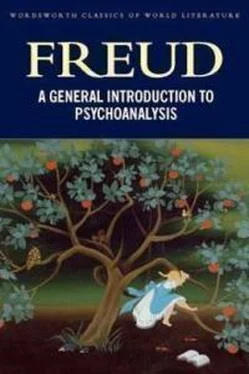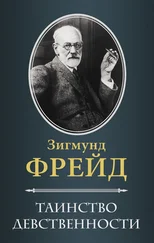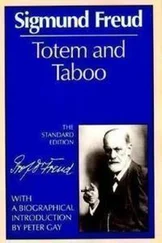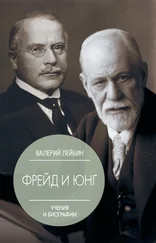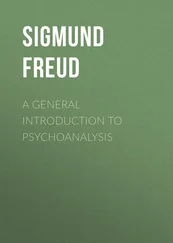Let us extract the sum of our observations on the anxiety of children: Infantile fear has very little to do with real fear, but is closely related to the neurotic fear of adults. It originates in unemployed libido and replaces the object of love that is lacking by an external object or situation.
Now you will be glad to hear that the analysis of phobias cannot teach much more that is new. The same thing occurs in them as in the fear of children; unemployed libido is constantly being converted into real fear and so a tiny external danger takes the place of the demands of the libido. This coincidence is not strange, for infantile phobias are not only the prototypes but the direct prerequisite and prelude to later phobias, which are grouped with the anxiety hysterias. Every hysteria phobia can be traced to childish fear of which it is a continuation, even if it has another content and must therefore receive a different name. The difference between the two conditions lies in their mechanism. In the adult the fact that the libido has momentarily become useless in the form of longing, is not sufficient to effect the transformation of fear into libido. He has long since learned to maintain such libido in a suspended state or to use it differently. But when the libido is part of a psychic impulse which has experienced suppression, similar conditions to those of the child, who cannot distinguish the conscious from the unconscious, are reëstablished. The regression to infantile phobia is the bridge where the transformation of libido into fear is conveniently effected. We have, as you know, spoken a great deal about suppression, but we have always followed the fate of the conception that was to be suppressed, because this was easier to recognize and to present. We have always omitted from our consideration what happened to the emotion that clung to the suppressed idea; and only now we learn that whatever quality this emotion might have manifested under normal conditions, its fate is a transformation into fear. This transformation of emotion is by far the more important part of the suppression process. It is not so easy to discuss, because we cannot assert the existence of unconscious emotions in the same sense as unconscious ideas. With one difference, an idea remains the same whether it is conscious or unconscious; we can give an account of what corresponds to an unconscious idea. But an emotion is a release and must be judged differently from an idea. Without a deeper reflection and clarification of our hypotheses of psychic processes, we cannot tell what corresponds to its unconscious stage. We cannot undertake this here. But we want to retain the impression we have gained, that the development of anxiety is closely connected with the unconscious system.
I said that the transformation into fear, rather a discharge in the form of fear, is the immediate fate of suppressed libido. Not the only or final fate, I must add. These neuroses are accompanied by processes that strive to restrain the development of fear, and succeed in various ways. In phobias, for instance, two phases of the neurotic process can be clearly distinguished. The first effects the suppression of libido and its transition to fear, which is joined to an external danger. The second consists in building up all those precautions and safety devices which are to prevent contact with this danger which is dealt with as an external fact. Suppression corresponds to the ego's flight from the libido, which it regards dangerous. The phobia is comparable to a fortification against outer danger, which is represented by the much feared libido. The weakness of the phobias' system of defense lies in the fact that the fort has been strengthened from without and has remained vulnerable within. The projection of peril from the libido into the environment is never very successful. In other neuroses, therefore, other systems of defense are used against the possibility of fear development. That is an interesting aspect of the psychology of neurosis. Unfortunately its study would lead us to digress too far, and presupposes a more thorough and special knowledge of the subject. I shall add only one thing more. I have already spoken to you of the counter siege by which the ego imprisons the suppression and which it must maintain permanently for the suppression to subsist. The task of this counter siege is to carry out diverse forms of defense against the fear development which follows the suppression.
To return to the phobias, I may now say that you realize how insufficient it would be to explain only their content, to be interested only in knowing that this or that object or situation is made the subject of a phobia. The content of the phobia has about the same importance for it as the manifest dream facade has for the dream. With some necessary restrictions, we admit that among the contents of the phobias are some that are especially qualified to be objects of fear through phylogenetic inheritance, as Stanley Hall has emphasized. In harmony with this is the fact that many of these objects of fear can establish connections with danger only by symbolic relations.
And so we are convinced of the central position that the problem of fear assumes in the questions of the neurotic psychology. We are deeply impressed with how closely the development of fear is interwoven with the fate of the libido and the unconscious system. There is only one disconnected point, one inconsistency in our hypothesis: the indisputable fact that real fear must be considered an expression of the ego's instincts of self–preservation.
Twenty-sixth Lecture
General Theory of the Neuroses - The Libido Theory and Narcism
Repeatedly in the past and more recently we have dealt with the distinction between the ego instincts and the sexual instincts. At first, suppression taught us that the two may be flatly opposed to each other, that in the struggle the sexual instincts suffer apparent defeat and are forced to obtain satisfaction by other regressive methods, and so find the compensation for defeat in their invulnerability. After that we learned that at the outset both have a different relation to the educator, Necessity, so that they do not develop in the same manner and do not enter into the same relationship with the principle of reality. We come to realize that the sexual instincts are much more closely allied to the emotional condition of fear than the ego instincts. This result appears incomplete only in one respect, which, however, is most important. For further evidence we shall mention the significant fact that non–satisfaction of hunger and thirst, the two most elementary instincts of self–preservation, never result in their reversal into anxiety, while the transformation of unsatisfied libido into fear is, as we have heard, one of the best known and most frequently observed phenomena.
No one can contest our perfect justification in separating the ego from sexual instincts. It is affirmed by the existence of sexual desire, which is a very special activity of the individual. The only question is, what significance shall we give to this distinction, how decisive is it? The answer will depend upon the results of our observations; on how far the sexual instincts, in their psychological and somatic manifestations, behave differently from the others that are opposed to them; on how important are the consequences which result from these differences. We have, of course, no motive whatever for insisting upon a certain intangible difference in the character of the two groups of instincts. Both are only designations of the sources of energy of the individual. The discussion as to whether they are fundamentally of the same or of a different character, and if the same, when it was that they separated from one another, cannot profit by the conceptions, but must deal rather with the underlying biological facts. At present we know very little about this, and even if we knew more it would not be relevant to our analytic task.
Читать дальше
